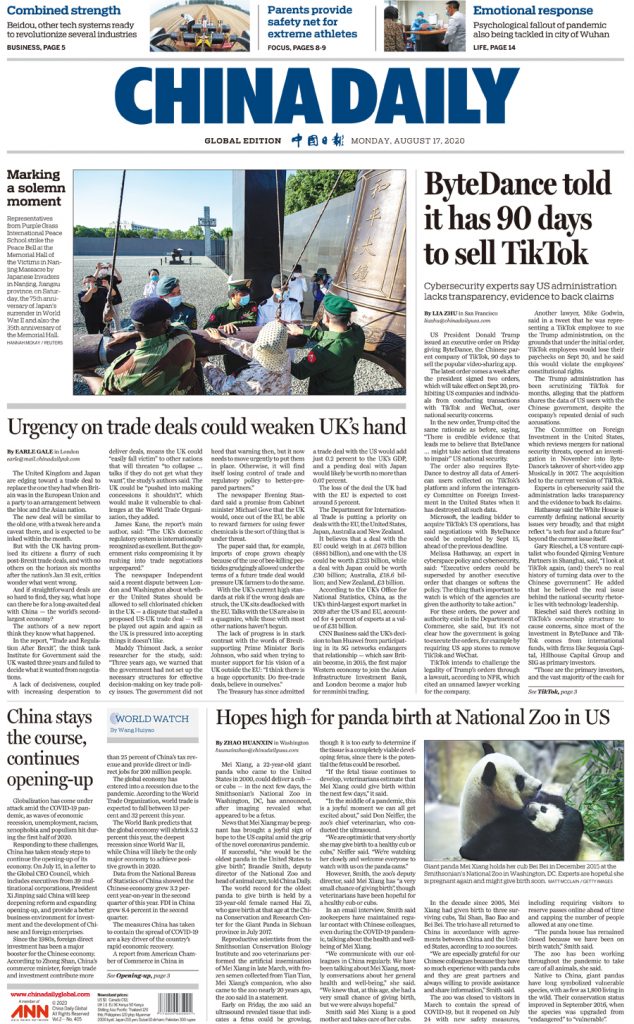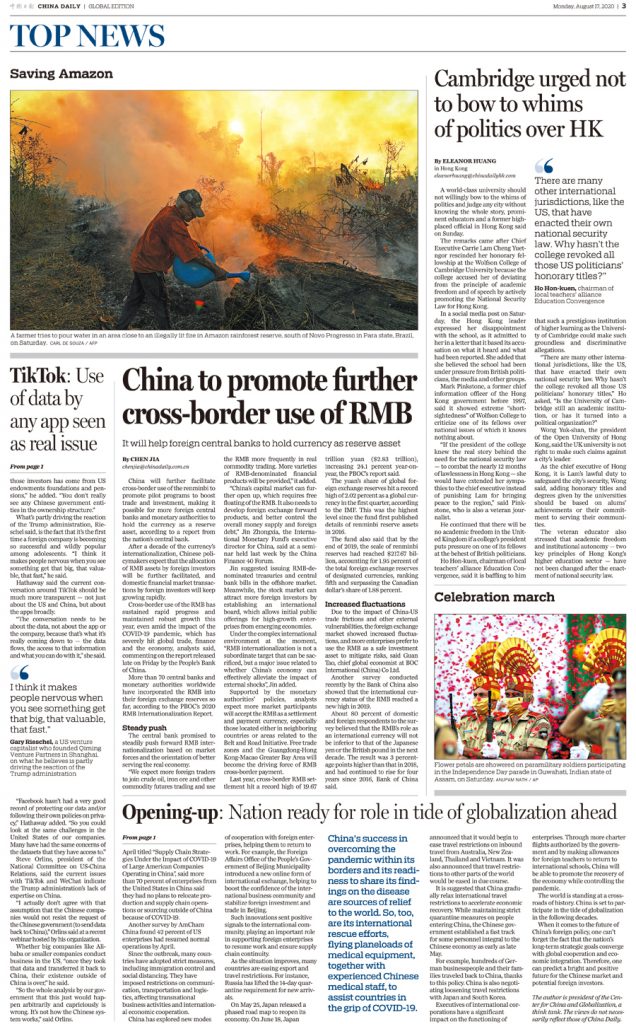Wang Huiyao: China stays the course, continues opening-up
China Daily | August 18 , 2020

By Wang Huiyao | President of the Center for China and Globalization(CCG)
Responding to these challenges, China has taken steady steps to continue the opening-up of its economy. On July 15, in a letter to the Global CEO Council, which includes executives from 39 multinational corporations, President Xi Jinping said China will keep deepening reform and expanding opening-up, and provide a better business environment for investment and the development of Chinese and foreign enterprises.
Since the 1980s, foreign direct investment has been a major booster for the Chinese economy. According to Zhong Shan, China’s commerce minister, foreign trade and investment contribute more than 25 percent of China’s tax revenue and provide direct or indirect jobs for 200 million people.
The global economy has entered into a recession due to the pandemic. According to the World Trade Organization, world trade is expected to fall between 13 percent and 32 percent this year.
The World Bank predicts that the global economy will shrink 5.2 percent this year, the deepest recession since World War II, while China will likely be the only major economy to achieve positive growth in 2020.
Data from the National Bureau of Statistics of China showed the Chinese economy grew 3.2 percent year-on-year in the second quarter of this year. FDI in China grew 8.4 percent in the second quarter.
The measures China has taken to contain the spread of COVID-19 are a key driver of the country’s rapid economic recovery.
A report from American Chamber of Commerce in China in April titled “Supply Chain Strategies Under the Impact of COVID-19 of Large American Companies Operating in China”, said more than 70 percent of enterprises from the United States in China said they had no plans to relocate production and supply chain operations or sourcing outside of China because of COVID-19.
Another survey by AmCham China found 42 percent of US enterprises had resumed normal operations by April.
Since the outbreak, many countries have adopted strict measures, including immigration control and social distancing. They have imposed restrictions on communication, transportation and logistics, affecting transnational business activities and international economic cooperation.
China has explored new modes of cooperation with foreign enterprises, helping them to return to work. For example, the Foreign Affairs Office of the People’s Government of Beijing Municipality introduced a new online form of international exchange, helping to boost the confidence of the international business community and stabilize foreign investment and trade in Beijing.
Such innovations sent positive signals to the international community, playing an important role in supporting foreign enterprises to resume work and ensure supply chain continuity.
As the situation improves, many countries are easing export and travel restrictions. For instance, Russia has lifted the 14-day quarantine requirement for new arrivals.
On May 25, Japan released a phased road map to reopen its economy. On June 18, Japan announced that it would begin to ease travel restrictions on inbound travel from Australia, New Zealand, Thailand and Vietnam. It was also announced that travel restrictions to other parts of the world would be eased in due course.
It is suggested that China gradually relax international travel restrictions to accelerate economic recovery. While maintaining strict quarantine measures on people entering China, the Chinese government established a fast track for some personnel integral to the Chinese economy as early as late May.
For example, hundreds of German businesspeople and their families traveled back to China, thanks to this policy. China is also negotiating loosening travel restrictions with Japan and South Korea.
Executives of international corporations have a significant impact on the functioning of enterprises. Through more charter flights authorized by the government and by making allowances for foreign teachers to return to international schools, China will be able to promote the recovery of the economy while controlling the pandemic.
The world is standing at a crossroads of history. China is set to participate in the tide of globalization in the following decades.
When it comes to the future of China’s foreign policy, one can’t forget the fact that the nation’s long-term strategic goals converge with global cooperation and economic integration. Therefore, one can predict a bright and positive future for the Chinese market and potential foreign investors.
Recommended Articles
-

Wang Huiyao: The 21st-century order has outgrown 20th-century institutions
-
Wang Huiyao: Beyond Blocs-Europe and China will not align nor compete, but selectively cooperate
-
Wang Huiyao: Key lessons from China’s ascent over the past 25 years
-
Wang Huiyao: Key lessons from China’s ascent over the past 25 years
-
Wang Huiyao: China and Latin America: Partners in a shared new era